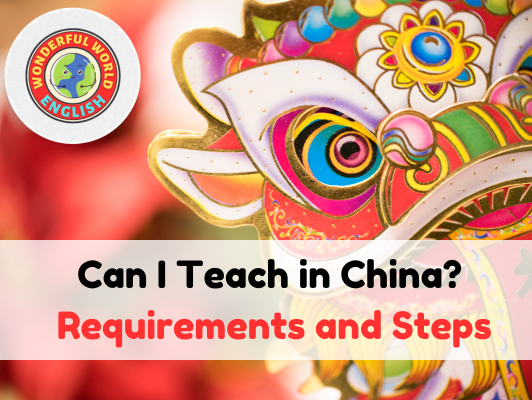Contents
Toggle
Meet David De’ Ath, founder, editor, and writer at Wonderful World English. With his extensive background as an English teacher, David provides valuable insights and practical tips on ESL for students and teachers alike.
Teaching in China presents a multitude of opportunities for native English speakers looking to explore a new culture and gain international work experience.
To be eligible to teach in China, candidates typically need to have a bachelor’s degree from their home country and a TEFL certification, which can often be obtained online.
The demand for English teachers in China is quite high, and positions are open in various educational institutions, such as public schools, private language centers, and international schools.
Working in China allows for professional development and offers a chance to experience life in one of the world’s oldest civilizations.
Teachers often benefit from competitive salaries and may receive additional perks such as rent-free housing.
The process of obtaining a work visa involves authenticating documents and liaising with your future employer, who usually assists throughout the visa procedure.
Equipped with the right qualifications and a zest for new cultural experiences, aspiring educators can find teaching in China to be a rewarding adventure.
Key Takeaways
- Individuals must meet certain educational and certification criteria to teach in China.
- There is a high demand for English teachers who provide various employment opportunities.
- Teaching in China offers professional growth and cultural immersion.
Qualifications and Requirements
To teach in China, educators are required to meet specific qualifications and obtain the necessary documentation.
The prerequisites include a Bachelor’s degree in any field, which is a fundamental requirement.
Furthermore, teaching English mandates either a TEFL certificate or a TESOL certification, enhancing the candidate’s credentials in language instruction.
The age requirement for teachers typically aligns with China’s work permit regulations, which usually favor applicants between the ages of 18 and 60.
A criminal background check is mandatory in addition to educational qualifications to ensure the safety and integrity of the educational environment.
Prospective teachers should be aware that China’s visa stipulations for employment are stringent.
The appropriate visa for educators is a Z Visa, which authorizes legal work status in the country.
To obtain a Z Visa, applicants must pass medical checks to verify their health condition, which is crucial due to China’s public health regulations.
For certain positions, especially in public education or international schools, a teaching license or an education degree may be requisite, demonstrating formal training in pedagogical methods.
Notably, some schools also prefer native English speakers, although this is not a uniform criterion across all institutions.
Lastly, the work permit is tied to the Z Visa, allowing teachers to earn a legal income in China.
For more insights into the documents required to teach English in China, check out the link below!
Related: Documents to Teach in China: Essential Paperwork
| Requirement | Note |
|---|---|
| Bachelor’s degree | In any subject |
| TEFL/TESOL certification | Preferred for English language instruction |
| Age | Typically 18-60 years (although many schools prefer new teachers to be 40 or under) |
| Criminal background check | Required for the safety of educational settings |
| Medical checks | For public health compliance |
| Z Visa | Mandatory for legal work status |
| Teaching license/Education degree | May be required for certain teaching positions |
Finding Teaching Positions
Securing a teaching position in China involves understanding the types of institutions seeking English teachers and strategizing the job search process effectively.
Not only are opportunities available across various educational settings but knowing where to look and how to present oneself can greatly influence the likelihood of success.
Types of Institutions
There are several types of institutions where one can pursue English teaching jobs in China, each offering unique environments and experiences:
- Public Schools: They typically cater to a large number of students, and English teachers can expect to work during regular school hours.
- Universities: English teachers at these institutions benefit from interacting with more mature students and often have a more relaxed schedule compared to other school settings.
- Private Schools: These schools commonly offer more competitive salaries and may provide additional facilities and resources compared to public counterparts.
- Kindergartens: These institutions require teachers who are energetic and adaptable to teaching very young learners through play-based education.
- Training Centers: Often focused on after-school and weekend classes, these centers look for teachers to provide specialized English instruction.
Job Search Strategies
When searching for job opportunities as an English teacher in China, applicants should use a variety of strategies:
- Job Boards: Utilize online resources such as new openings for English teaching jobs to find the latest listings.
- Teach Abroad Programs: Organizations like CIEE offer comprehensive programs, including job placement, TEFL certification, and visa assistance.
- Networking: Leverage social media and professional networks, as many positions are filled through referrals and word-of-mouth.
- Visit Institutions: For those already in China, visiting schools or training centers in person can be advantageous in finding unadvertised positions.
Employing these strategies and being familiar with the types of institutions can significantly improve the chances of finding teaching positions in China.

Living and Working in China
Living and working in China as an English teacher can be both exhilarating and challenging, presenting a unique blend of cultural immersion and economic opportunity.
Teachers often benefit from competitive salaries and a low cost of living, which can contribute to a comfortable lifestyle.
Adjusting to Chinese Culture
Adapting to Chinese culture requires an openness to new experiences and a willingness to learn about the local customs and social norms.
From intricate social etiquette to local culinary delicacies, there is much to explore.
Learning Mandarin can significantly enhance this cultural adjustment, helping teachers build rapport with students and colleagues and navigate daily life more effectively.
Cost of Living and Compensation
The cost of living in China varies by city, with metropolises like Beijing and Shanghai being more expensive.
Despite this, many English teachers find that their monthly salary covers their expenses and allows for travel and savings.
Benefits such as rent-free housing, medical insurance, and airfare reimbursement greatly enhance financial savings.
The salaries for English teachers in China are often considered high relative to the cost of living, and supplementary perks like a completion bonus add to the attractiveness of teaching positions.
Related: China Cost of Living: An Overview of Expenses in 2024

Cultural Insights and Experiences
Teaching English in China offers a unique set of cultural insights and experiences for expatriate teachers.
Those who teach in China find themselves in the midst of a rich historical tapestry, engaging with both ancient traditions and modern advancements.
A classroom in China is often a microcosm of this balance, where respect and hierarchy play vital roles.
Foreign English teachers tend to observe quickly that Chinese students exhibit a strong sense of diligence and respect toward educators.
It’s not uncommon for university students to approach classes with a seriousness reflective of China’s value of education.
- Language Barrier: While English is the medium of instruction, the language barrier outside the classroom can be significant, often requiring patience and creative communication methods.
- Cultural Challenges: Adapting to local customs and navigating social norms are part of the daily life of expat teachers.
- Cultural Experiences: Immersing in local festivals and traditions provides invaluable insight into the Chinese way of life.
Many teachers find that the cultural experiences significantly enrich their lives.
The pandemic has imposed difficulties, yet it has also led to new teaching methods and resilience in face of adversity.
The opportunity to teach English abroad, particularly in China, often comes with unexpected travel opportunities.
These opportunities enable teachers to explore a diverse landscape of cities, rural areas, and natural wonders.
For many, living and teaching in China has become not just a job but a profound cultural journey.

Contact us for more information to get started on your journey!
Conclusion
A teaching journey in China can be an enriching and transformative experience for aspiring educators.
With its high demand for English teachers, China offers numerous opportunities across various educational settings, accompanied by competitive salaries and perks like rent-free housing.
For those looking to immerse themselves in a new culture while advancing their teaching careers, China provides a dynamic environment where professional growth and cultural exploration go hand in hand.
By meeting the necessary qualifications, navigating the visa process effectively, and embracing the local culture and community, educators can make a significant impact both in their lives and the lives of their students.
This journey enhances professional credentials and enriches personal experiences, making teaching in China a valuable chapter in any educator’s career.
We hope you find value in this information; you can contact us if you are interested in the adventure of a lifetime teaching English in China.
Have a wonderful day!
Image Attribution: All images licensed via canva.com





